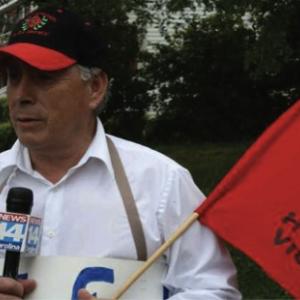Patrick O'Neill, a religion writer, is co-founder of the Fr. Charlie Mulholland Catholic Worker House, an intentional Christian community that provides hospitality to men, women and children in crisis. He and Mary Rider have eight children.
Posts By This Author
Threading the Needle
JUST AFTER LUNCH, Eulalia Francisco shows Molly Hemstreet two pieces of white elastic bands, one of them slated for use as waistbands in a batch of woolen children’s pajamas being cut and sewed by the North Carolina-based, worker-owned cooperative Opportunity Threads.
Francisco, who had just two years of formal schooling in her native Guatemala, has noticed the elastic recommended for the sewing job is not the best choice for these pajamas. She recommends another elastic band.
Francisco is “our master sewer,” says Hemstreet, founder of Opportunity Threads, who agrees with Francisco’s suggestion and immediately orders the correct elastic.
After four years together, Francisco and Hemstreet, both worker-owners of Opportunity Threads, have a strong, trust-based working relationship. Hemstreet, an Episcopalian, earns the same wage as the other worker-owners and sees Opportunity Threads as having a spiritual component. “Before I met my husband, I thought deeply about going into cloistered work,” Hemstreet says. “I think of that whole thing of prayer and work, and that’s how I come here every day. We’re not making icons, but we’re doing work, and we do things in a joyful, prayerful way.”
The co-op grew from humble beginnings. After completing degrees in Spanish and Latin American studies at Duke University, Hemstreet moved with her husband, Francisco Risso, back to her hometown of Morganton, N.C., to open a Catholic Worker House. The local chicken plant hires many Latinos, but the work is hard and tedious, the pay not nearly a livable wage. So Hemstreet, with no formal training in business, explored the world of cooperatives, thinking it might be a good path to more meaningful and dignified employment for the Latino community.
Tales of the Disobedient
SHORTLY AFTER his 1983 appointment as archbishop of San Salvador during the Salvadoran civil war, Arturo Rivera y Damas traveled to the United States. Rivera succeeded Archbishop Óscar Romero, who was martyred for his outspoken condemnation of the war. I asked a Maryknoll sister—who lost three community members, killed by the Salvadoran death squads—to assess Rivera’s comments to the U.S. media. “He does not have the gift of martyrdom,” she said.
That comment gives perspective to the efforts of nonviolent peace activists in the U.S., many of whom have risked their freedom, usually for short stints, as a consequence of civil disobedience. In Crossing the Line: Nonviolent Resisters Speak Out for Peace, Rosalie G. Riegle chronicles the action-to-court-to-jail-and-prison journeys of some of the last century’s most committed pacifists. While a few told harrowing stories, for the vast majority the consequences fell far short of martyrdom. This is not to belittle their efforts, but rather to beg the question: Why do so few Christians resist the violence and war-making of the U.S. government?
Riegle’s well-done compilation of 65 oral histories might prompt more people to step into the fray. To date, hundreds of U.S. pacifists have served hundreds of years, mostly in federal prison, for crossing lines, burning draft cards and draft files, and hammering on the weapons of war. At press time, three Catholic pacifists known as the Transform Now Plowshares—Sister Megan Rice, Greg Boertje-Obed (interviewed in Riegle’s book), and Michael Walli—await a January sentencing for federal felony charges stemming from cutting fences and hammering at the Y-12 National Security Complex in Oak Ridge, Tenn.
On Earth As In Heaven
A RECENT ONLINE profile referred to farm worker labor union leader Baldemar Velasquez as both "militant" and "genius." It's hard to argue with either of those designations for the 66-year-old founder of the dynamic Farm Labor Organizing Committee (FLOC). The Toledo, Ohio-based union has used a David-vs.-Goliath style to bring corporate giants to the collective bargaining table, thereby improving the living and working conditions of perhaps the least powerful worker group in the nation.
Velasquez, an ordained evangelical Christian who received a MacArthur Fellowship in 1989, simply sees FLOC's work as God's work, and his opponents might consider following the wisdom of the Pharisee Gamaliel, who said of the apostles, "I tell you, keep away from these men and let them alone ... You might even be found opposing God!"
Velasquez, who founded FLOC in 1967, has yet to lose a battle. A 1967 strike Velasquez led against Ohio tomato growers resulted in two dozen growers signing union contracts. A national FLOC boycott of Campbell's Soup in the 1980s resulted in a three-way collective bargaining agreement that raised wages and improved working conditions for tomato workers. A six-year campaign in North Carolina resulted in another three-way deal between FLOC, cucumber growers, and the Mt. Olive Pickle Company. Today, FLOC is going after another giant, Reynolds American, the second-largest U.S. producer of tobacco products.
Come With Me Into the Fields
BREAKTHROUGHS ON immigration reform will make life easier for some Latino immigrants, but in the sweltering, often-toxic fields where farm workers toil each summer from Maine to California, conditions can still be dehumanizing and dangerous. There is a silver lining, however. With the burgeoning growth of the nation's Latino population, there are more advocates than ever working to improve the plight of the men, women, and often children who do hard labor on our nation's farms.
With a mostly young, deeply committed staff, the Florida-based Coalition of Immokalee Workers (CIW) is doing solid grassroots work to make life better for workers in the state's tomato industry. With cooperation from 11 food retail and food service corporations, CIW has implemented the Campaign for Fair Food, which has brought modest wage increases, worker protections, and grievance procedures to farms that produce 90 percent of the state's tomato crop.
Using a worker-led administrative structure and significant public pressure, CIW has brought companies such as McDonald's, Burger King, Pizza Hut, and KFC into its program that asks corporate partners to kick in an extra penny per pound for the tomatoes they buy. That premium is passed on to growers to increase worker pay.
Elbin Perez, 23, a farm worker from Guatemala, has been working in the U.S. for six years, sending part of his wages back home to his parents and five siblings. As a CIW member, Perez leads "worker-to-worker education programs." Those trainings educate workers about CIW's code of conduct, which growers have agreed to uphold. Reforms include use of time clocks, guaranteed minimum wage, and water and shade breaks.

